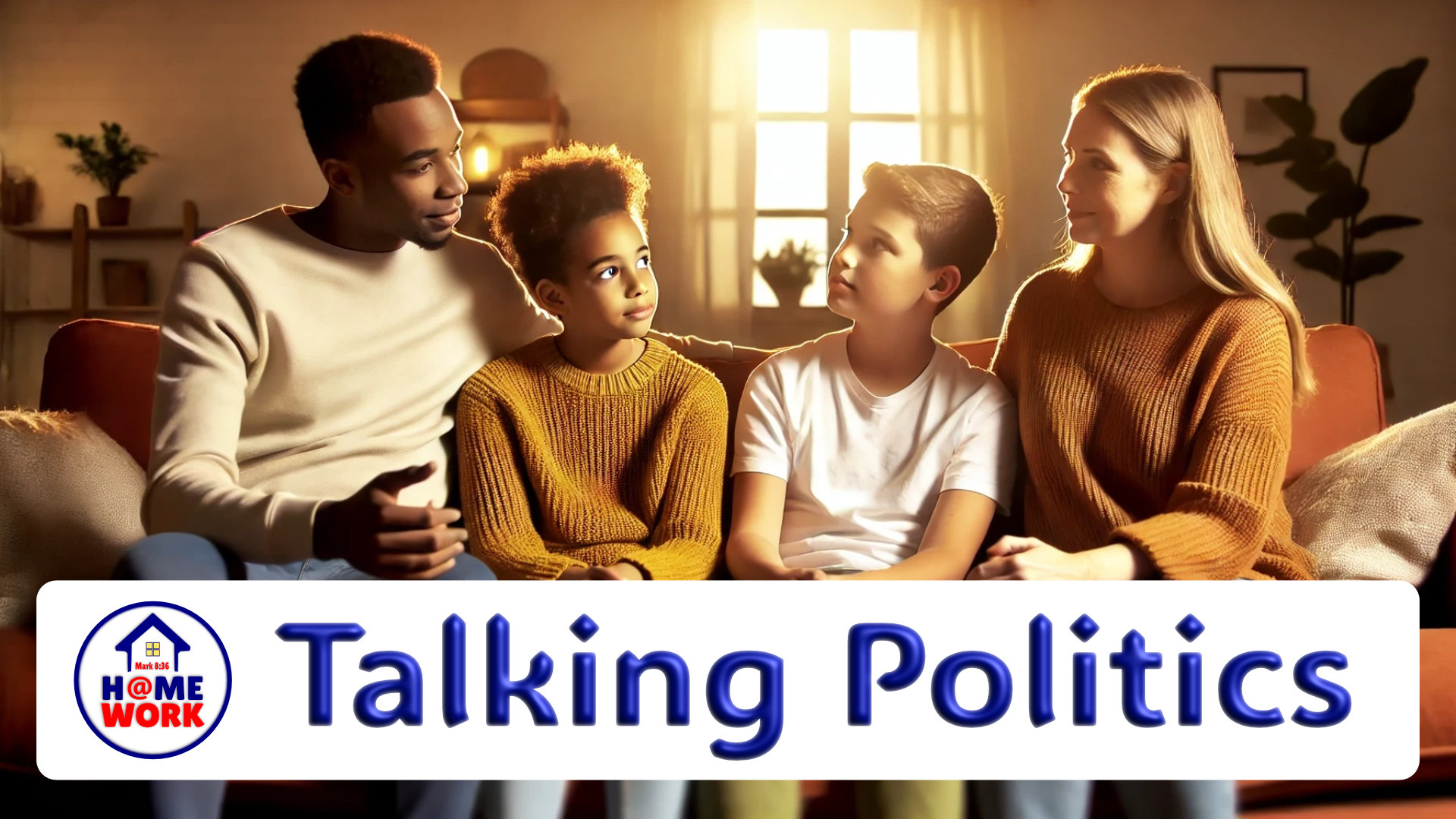This is the transcript of the youtube video EPISODE 002 - Respect and Empathy in Divisive Times: Some thoughts on Navigating Political Differences. This video was published on our YouTube channel at https://www.youtube.com/@thehomeworkdad

Transcript Starts Here:
Okay, the election's over. Now what? Let's talk about it. This is going to be kind of an odd video for me. I'm sitting here in my studio. You’ll notice on both sides of my head, here and here, are two stuffed animals. These stuffed animals are in my office as a daily reminder to remember my kids, to remember what it means—the actions we take every day—and the effect those actions have on our kids.
My wife and I have been incredibly blessed over the years. We live in an amazing country. My wife and I follow the teachings of Jesus Christ. We don’t always agree with others in the Christian community. There are many in the Christian community who voted in this past election for Donald Trump. I can say that, for me, I am a “never-Trumper.” I never would have voted for Trump. I believe very strongly that the office of the presidency of the United States demands that the people in that office respect the office itself, as well as the people who have helped make that office what it is. The office deserves respect, and the office demands it.
One of the hardest things about being a parent is explaining to your kids why certain things happen. My wife, Jodell, and I have raised our kids to be independent thinkers, to be individuals who ask questions and don’t just accept simple answers. And here we are, living in a country where a large percentage of the Christian people who follow Christ, as well as many others, have voted to elect Donald Trump as the next president of the United States. An election that, for many, doesn’t make sense. I’ve seen the way he treats people. I’ve seen his rhetoric. I’ve seen the many lies that he’s told, and I’ve said to myself that he does not even come close to representing what I believe the presidency of the United States demands. But here we are.
We are living in a country now where, despite Donald Trump’s rhetoric, despite his open and blatant claims about things he thinks should be done or would do, at least half of our country has chosen to vote for him. So if you’re like me and you have kids, and for whatever reason, you did not vote for Trump, you’re probably thinking about your kids and asking, “What now? How do I explain this to my kids?” I urge you to think seriously before you talk about it with your kids. Think seriously about how your words will affect them. They already sense the tension. They know that this outcome isn’t what you wanted or hoped for. Whether or not they agree with you, they feel your tension.
So, what does that look like when we’re talking with our kids? What does that look like as we move forward and January 20th rolls around, and Donald Trump is sworn in as the next president? I want to pause and jump back to when people were discussing voting for Trump before the election. There are people I know who used phrases like, “We’re not voting for a person to be the pope” or “We’re not voting for a person to be a spiritual leader. We’re voting for a person to do a job.” I find that incredibly sad, especially considering that those saying this often call themselves Christians. Somehow, they seem to think it’s okay to lower our standards for what it means to be the president of the United States or a leader, and to me, that’s sad.
I believe that a leader in any household, and even more so a leader of any country, should never have lowered standards. We should never accept that it’s okay to “hire someone for a job” without considering the impact on our kids. We need to recognize that this message—the one that says it’s okay to lower our standards—is not necessarily the message we want our kids to receive. This idea seems to suggest that the standards Christ puts in front of us can be lowered.
A conversation I’ve had with our kids, and that I’d suggest you have with yours, is that regardless of the outcome, the office of the presidency of the United States—not the person in the office, but the office itself—demands our respect. I’ve already said I never would have voted for Trump. I am a “never-Trumper.” I will never vote for Trump. He does not represent anything I believe is necessary for that office, nor does he represent anything I believe is positive for our country.
Some may ask, “Is there anything positive about Trump?” Of course, there are positive things about everyone, but this video isn’t about focusing on his positives. It’s about focusing on the messages we are sending to our children when we talk. When we discuss, in this case, President Trump, or any other president, and the presidency as January 20th approaches, I’ve heard people say, “Trump will never be my president.” I understand that sentiment, but I also understand that it’s a message that erodes the belief that the office of the presidency deserves respect, regardless of the office holder’s agreement with us.
The more we erode that respect, the further we move towards a system where we accept presidents who don’t meet our standards. We lower our expectations and, in turn, say we’re willing to accept less. And I think that’s wrong. If you’re watching this video, I urge you to consider seriously whether you want the presidency to mean something again. Because if you do, in a democracy, the reality is that when someone has been elected by the majority, as much as I don’t like it, when Donald Trump is sworn in, he will be my president.
So, what does that mean moving forward? Our kids will feel our anxiety just as we do. The more anxious we are, the more anxious they’ll be. Jodell and I know that our kids, Antonia and Julia, are emotional like their dad. They care deeply in their own ways, and both are in public service. If I were talking directly to them, I’d remind them that even though the events of the day are not what we had hoped for, there are changes happening. And when those changes happen, we have to adjust how we react.
Part of that means we need to avoid perpetuating negativity. We need to give others the right to their sadness or different beliefs and recognize that it’s okay. But we also have to know our limits. If we’re around people who are negative or espousing views we don’t agree with, remember that we have the choice to walk away, to avoid that negativity.
My mission, being The Home Work Dad, is to be there for purpose-driven parents, helping parents navigate what it means to run a business from home while keeping up with the responsibilities of parenting. Part of that responsibility means recognizing that the way we respond to events, like this election outcome, affects our kids. Our actions and the emotion behind them overflow onto those around us, especially our kids.
So what does it look like moving forward with this new reality? If you don’t like the outcome, get involved. If you voted for Trump, recognize that many people who didn’t are afraid. They have family members, friends, or loved ones who fear living in the kind of world that Donald Trump describes, or that Project 2025 outlines. For a lot of people, that’s incredibly scary. If you call yourself a Christian and voted for Trump, I think it’s your responsibility to reach out, to show love, and patience, to build bridges instead of walls.
Let’s teach our kids through our actions that we mean what we say. If you voted for Trump and have your reasons, don’t put down those who didn’t, as this can drive a wedge between you and your kids. I believe that’s not what you want.
I’m not entirely sure how to end this video. I’m talking to a vast audience. On one hand, you have those who believe Trump is the man for the job. On the other, you have those who think that makes no sense. For our kids’ sake, we need to unite in a way that doesn’t demonize the other. It should be clear that just because I disagree doesn’t mean the other person is bad or stupid. It doesn’t mean we put each other down. It just means we disagree. In life and in democracy, disagreements are healthy. They show that we’re willing to stand up for what we believe in.
One of the keys to unity is understanding that not everyone walks in the same shoes or believes the same way, and that’s okay. But you don’t build friendships or relationships by putting others down. Unity requires building connections with others in society, not just with our families. You can’t go through life putting down other groups and expect the country to become what you want it to be.
So that’s my takeaway from this video. Recognize that our actions have consequences, and put effort into making relationships with your kids, spouse, and those around you the best they can be. Let’s return to a place where, especially if you follow Christ, we expect more not only from ourselves but from our leaders—not that they always agree with us, but that they hold to certain standards. Thank you for your time, and I pray that those watching this video find something helpful in it. May God richly bless you and your family in the days, weeks, and years ahead.

